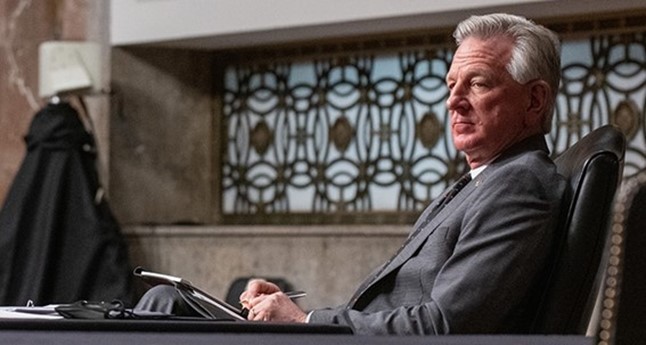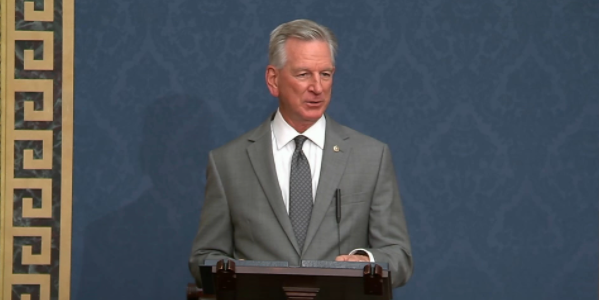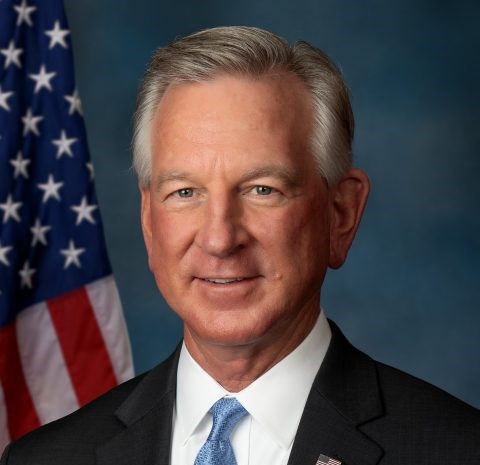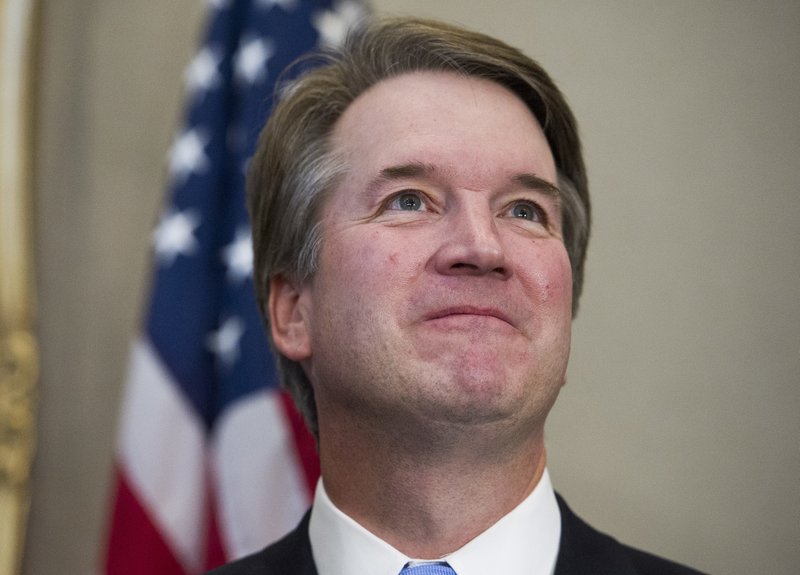Tommy Tuberville supports bill to permanently ban taxpayer funding for abortions

U.S. Senators Tommy Tuberville and Katie Britt joined 45 of their Senate colleagues in introducing the No Taxpayer Funding for Abortion Act to establish a permanent prohibition on federal funding for abortion. Tuberville said in a statement, “Every life is sacred.” “Millions of hardworking Americans believe that life begins at conception and don’t want their taxpayer dollars inadvertently funding abortions,” said Sen. Tuberville stated. “As a Christian and as a conservative, I share their belief that every life is sacred and every American has a right to life. That’s why I’m proud to sign on to this legislation that will solidify abortion funding restrictions that have been in place for decades and better protect the unborn.” “Most Americans do not want their hard-earned tax dollars being used for abortion-on-demand, but our current patchwork of regulations has brought years of uncertainty,” Sen. Roger Wicker said. “The No Taxpayer Funding for Abortion Act would simplify federal rules, ensuring that American tax dollars are never used for the destruction of innocent, unborn life.” The bill seeks to change 40 years of inconsistent policies that have regulated federal funding for abortion. It would make funding restrictions permanent for abortion and elective abortion coverage, including the Hyde Amendment, which requires annual approval. The legislation would also eliminate taxpayer-funded subsidies for elective abortion coverage currently offered on Affordable Care Act exchanges through refundable tax credits. Tuberville, Wicker, and Britt joined Sens. Mitch McConnell (R-Kentucky) John Barrasso (R-Wyoming), Marsha Blackburn (R-Tennessee), John Boozman (R-Arkansas), Mike Braun (R-Indiana), Ted Budd (R-North Carolina), Shelley Moore Capito (R-West Virginia), Bill Cassidy (R-Louisiana), John Cornyn (R-Texas), Tom Cotton (R-Arkansas), Kevin Cramer (R-North Dakota), Mike Crapo (R-Idaho), Ted Cruz (R-Texas), Steve Daines (R-Montana), Joni Ernst (R-Iowa), Deb Fischer (R-Nebraska), Lindsey Graham (R-South Carolina), Chuck Grassley (R-Iowa), Bill Hagerty (R-Tennessee), Josh Hawley (R-Missouri), John Hoeven (R-North Dakota), Cindy Hyde-Smith (R-Mississippi), Ron Johnson (R-Wisconsin), John Kennedy (R-Louisiana), James Lankford (R-Oklahoma), Mike Lee (R-Utah), Cynthia Lummis (R-Wyoming), Roger Marshall (R-Kansas), Jerry Moran (R-Kansas), Markwayne Mullin (R-Oklahoma), Rand Paul (R-Kentucky), Pete Ricketts (R-Nebraska), Jim Risch (R-Idaho), Mitt Romney (R-Utah), Mike Rounds (R-South Dakota), Marco Rubio (R-Florida), Eric Schmitt (R-Missouri), Rick Scott (R-Florida), Tim Scott (R-South Carolina), Dan Sullivan (R-Alaska), Thom Tillis, (R-North Carolina), John Thune (R-South Dakota), J.D. Vance (R-Ohio), and Todd Young (R-Indiana). Swing Republican Sens. Lisa Murkowski and Susan Collins did not sign off on the legislation, and neither did any of the 52 Senate Democrats who hold the majority in the body. U.S. Representative Christopher Smith (R-New Jersey) has introduced similar legislation in the House of Representatives. To connect with the author of this story, or to comment, email brandonmreporter@gmail.com.
Tommy Tuberville works to undo vaccine mandates for military

U.S. Senator Tommy Tuberville joined colleagues in an effort to secure a provision in the 2023 National Defense Authorization Act (NDAA) to protect servicemembers from the Biden administration’s controversial COVID-19 vaccine mandate. The NDAA was passed last night in the Senate. Sen. Marsha Blackburn (R-Tennessee) led a group that included Sens. Tuberville, Roger Marshall (R-Kansas), Cindy Hyde-Smith (R-Mississippi), Mike Braun (R-Indiana), Deb Fischer (R-Nebraska), Joni Ernst (R- Iowa), Mike Crapo (R-Idaho), Steve Daines (R-Montana), John Hoeven (R-North Dakota), and Jim Risch (R-Idaho) in a joint statement after helping to successfully secure the provision protecting the servicemembers from the mandate in the 2023 NDAA. “In the United States, the number of new servicemembers joining the military is reaching a near record low,” the Sens. wrote in a joint statement. “The United States needs a strong military to protect our country against the growing threats facing our nation. We are pleased that the final conferenced bill includes language mirroring our amendments’ efforts to protect troops from being fired due to Biden’s COVID vaccine mandate without fair appeal and to the harm of service readiness.” Tuberville has expressed concerns about the historically low military recruitment numbers; and how the COVID-19 vaccination requirements for service members is affecting the military’s ability to recruit and retain personnel. Tuberville has repeatedly addressed these concerns to top U.S. Department of Defense officials and called for hearings on the issue. “Only nine percent — only nine percent — of young people even want to serve,” Tuberville said in a recent Senate hearing with DoD officials. “That’s a small, small pool. Faith in our military has collapsed. I’ve reviewed the list of speaking engagements for senior leaders at the Pentagon and could find no trace — zero — of anyone speaking publicly about recruiting. The leaders of our military. But there were plenty of speeches on climate change, pride month, and global water security. What is going on here?” Additionally, Sen. Tuberville has helped introduce two pieces of legislation, Preserving the Readiness of Our Armed Forces Act and Stop Firing Our Servicemembers Act, to push back against the Biden administration’s mandates. The Preserving the Readiness of our Armed Forces Actwould prohibit the involuntary dismissal of a service member for refusing the COVID-19 vaccine until each military service achieves its authorized end strength; while the Stop Firing our Servicemembers Act would prohibit federal funds from being used to require a member of the National Guard to receive a COVID-19 vaccination. The NDAA is a bipartisan bill that sets the goals for the U.S. military each year. Tuberville is in his first term representing the state of Alabama in the U.S. Senate. To connect with the author of this story, or to comment, email brandonmreporter@gmail.com.
Tommy Tuberville objects to cuts to veterans pharmacy network

U.S. Senator Tommy Tuberville and 15 of his Senate colleagues sent a letter Friday to Seileen Mullen, Acting Assistant Secretary of Defense for Health Affairs, seeking answers about TRICARE beneficiaries’ ability to maintain access to local pharmacies. On October 24, unless the VA can reach a new agreements with Express Scripts and other providers, thousands of local community pharmacies will not be able to service 9.6 million TRICARE patients and their families. Express Scripts is terminating the contract with TRICARE on October 24 instead of waiting for them to expire at the end of the year, heightening concerns that millions of veterans and their families will not be able to get their medicines at their neighborhood pharmacies. “It has been brought to our attention that Express Scripts has reduced reimbursements for prescriptions dispensed at in-network retail pharmacies for 2023,” wrote Tuberville and the other Senators. “These reductions may leave many retail pharmacies unable to participate in the TRICARE Pharmacy Program, thus significantly impacting 9.6 million TRICARE beneficiaries’ access to local pharmacies. Most recently, Express Scripts notified pharmacies and beneficiaries that current 2022 pharmacy contracts will expire October 24, 2022, rather than the end of the year. This will only further reduce the pharmacy network for TRICARE patients and their families and may force beneficiaries to change pharmacies at a time when many receive annual vaccinations.” “Pharmacists continue to be one of the most accessible health care providers in the United States,” the Senators continued. “Over 90 percent of Americans live within five miles of a community pharmacy, and 76.5 percent of pharmacies in rural areas are independent community pharmacies. As you know, in addition to dispensing medications and vaccines, community pharmacies provide services that lead to better health outcomes, lower overall administrative fees, and valuable in-person consultations with a healthcare provider.” Tuberville was joined in the letter by Sens. Tom Cotton (R-Arkansas), Roger Marshall (R-Kansas), Cindy Hyde-Smith (R-Mississippi), Chuck Grassley (R-Iowa), Steve Daines (R-Montana), John Boozman (R-Arkansas), Marsha Blackburn (R-Tennessee), Shelley Moore Capito (R-West Virginia), John Thune (R-South Dakota), Jerry Moran (R-Kansas), Mike Rounds (R-South Dakota), John Barrasso (R-Wyoming), Deb Fischer (R-Nebraska), Mike Braun (R-Indiana), and Cynthia Lummis (R-Wyoming). 15,000 pharmacies will leave the TRICARE network on October 24. To connect with the author of this story, or to comment, email brandonmreporter@gmail.com.
Tommy Tuberville, colleagues stand up for agriculture producers

On Monday, Sen. Tommy Tuberville joined 31 colleagues in sending a letter to the Securities and Exchange Commission (SEC) to push back against overreach that would place climate disclosure regulations on farmers, ranchers, and agriculture producers. The senators are concerned about the proposed rule on “Enhanced and Standardization of Climate-Related Disclosures for Investors.” The proposed rule would require publicly-traded companies to include certain climate-related disclosures in their registration statements and periodic reports. The group believes this will impose burdensome greenhouse gas reporting requirements on all entities within a company’s value chain, including farmers and ranchers who fall outside of the SEC’s congressionally-provided authority. “The SEC’s congressionally-mandated mission is to protect investors; foster fair, orderly, and efficient markets; and facilitate capital formation,” the senators wrote. “However, this proposed rule moves well beyond the SEC’s traditional regulatory authority by mandating climate change reporting requirements that will not only regulate publicly traded companies, but will impact every company in the value chain. Should the SEC move forward with this rule, it would be granted unprecedented jurisdiction over America’s farms and ranches, creating an impractical regulatory burden for thousands of businesses outside of the scope of the SEC’s purview, including our nation’s farmers and ranchers,” they continued. Other signers include U.S. Senators John Hoeven (R-ND), Tim Scott (R-SC), Cynthia Lummis (R-WY), Roger Marshall (R-KS), James Risch (R-ID), Mike Crapo (R-ID), Steve Daines (R-MT), Thom Tillis (R-NC), Richard Burr (R-NC), Ted Cruz (R-TX), John Barrasso (R-WY), Bill Hagerty (R-TN), Tom Cotton (R-AR), Rick Scott (R-FL), Chuck Grassley (R-IA), Roger Wicker (R-MS), Deb Fischer (R-NE), Kevin Cramer (R-ND), John Kennedy (R-LA), Bill Cassidy (R-LA), Mike Braun (R-IN), Mike Rounds (R-SD), Joni Ernst (R-IA), James Lankford (R-OK), John Cornyn (R-TX), Jerry Moran (R-KS), Lindsay Graham (R-SC), John Thune (R-SD), Todd Young (R-Ind.), John Boozman (R-AR) and Josh Hawley (R-MO).
GOP senators rave about Brett Kavanaugh; Dems prepare to grill him

Now that Supreme Court nominee Brett Kavanaugh has met privately with almost every Republican senator, it’s becoming increasingly clear President Donald Trump’s pick for the bench is running into little GOP resistance to confirmation this fall. The conservative appellate judge is breezing past swirling questions over his views on executive power and his approach to gay marriage, abortion and other legal issues. Kavanaugh left some Republicans with the impression that his earlier reluctance to investigate sitting presidents would not impede the Russia investigation of special counsel Robert Mueller. Other senators avoided such queries, preferring more of a get-to-know-you session with the 53-year-old judge to hear his story. Ask the GOP senators what they’re learning in their private chats and they’ll tell you the following: Kavanaugh loves his family. Lives for the law. And, like the president he once worked for, George W. Bush, he’s open and chatty, the kind of guy you’d like to have a beer with. “I just wanted to understand — try to understand — what’s in his heart,” said Sen. John Kennedy, R-La., who added that he was saving his legal questions for Kavanaugh’s confirmation hearings. “He impresses me as the sort of guy that would actually talk and get to know the people who clean his office.” The practice of Supreme Court nominees making “courtesy calls” to senators seems to have begun around 1970, according to the Senate Historical Office. That year, nominee Harry Blackmun made the rounds ahead of his confirmation hearing before the Judiciary Committee. Some senators use the visits to probe the nominee’s judicial philosophy, while others treat it more like a photo op. Since being nominated July 9, Kavanaugh has met with 47 senators — all but one of them Republican — at a rapid clip. The meetings have created growing momentum for Kavanaugh among Republicans that Democrats may be hard-pressed to stop. Even one early skeptic, Sen. Rand Paul of Kentucky, is now a yes vote. Still, the most challenging meetings for Kavanaugh are yet to come. Two key Republican senators, Lisa Murkowski of Alaska and Susan Collins of Maine, remain among the holdouts. They plan to meet with the judge this month. But even those two independent-minded senators, who both support abortion rights, may be unwilling to break with their party and prevent Trump from filling a second seat on the Supreme Court. Kavanaugh is also likely to meet with Democrats in mid-August, and they are certain to press the judge on a variety of hot-button issues. Only one Democrat,Joe Manchin of West Virginia, has met with Kavanaugh so far, and a person familiar with that session said Kavanaugh stressed his independence. The Republicans who have already met with Kavanaugh are leaving the meetings increasingly confident in Trump’s choice. Sen. David Perdue of Georgia said he asked the judge what he holds important. “We talked about how the partisanship really has created this gridlock and therefore it weakens us in terms of standing up,” said Perdue, a close ally of the president. “He says, ’Well, my desire all along has been to be a very studious defender of the Constitution and try to interpret the law, not make law.” Sen. Thom Tillis of North Carolina said he was satisfied that Kavanaugh’s earlier skepticism of special counsel investigations — like Mueller’s probe — was rooted in his work on Kenneth Starr’s team investigating Bill Clinton, rather than the events of today. “I don’t see how the two can be intertwined,” Tillis said. GOP Sen. James Lankford of Oklahoma said he did not broach the topic because he is already convinced Kavanaugh’s writings are not applicable to Mueller’s probe. “I didn’t take it that we shouldn’t do investigations. At all,” Lankford said. “The fact of the matter is Judge Kavanaugh is going to sit on the United States Supreme Court when we’re through,” said Sen. Orrin Hatch, R-Utah. Late last week, Democrats lost ground in their fight to unearth some 1 million documents related to Kavanaugh’s time as staff secretary at the Bush White House, a three-year stint on his resume that Republicans say is irrelevant to his qualifications for the court. Republicans have not asked for the records, and the National Archives has told Democrats it cannot process their request without GOP support. Kristine Lucius, the executive vice president for policy at the advocacy group The Leadership Conference on Civil and Human Rights, is pushing for the full release of the Kavanaugh documents and not those being handpicked by Republicans. She objects to “the notion that we would just have a curtain within three years of his record.” Democrats now plan to take their case directly to Kavanaugh, potentially turning the “courtesy calls” into cross-examination sessions of his thoughts on Bush-era topics like the detention of terrorism suspects and signing statements on legislation. Those subjects are likely covered in the documents Republicans refuse to seek. Republicans counter that there are already plenty of ways to scrutinize Kavanaugh’s record. He has handled more than 300 cases since 2006 as an appellate judge. Already the Judiciary Committee has requested some 125,000 files from Kavanaugh’s other years in the White House counsel’s office and 20,000 from his work on the Starr investigation. And with a 51-49 GOP majority in the Senate, narrowed with the longtime absence of the ailing Sen. John McCain, R-Ariz., Republicans will be able to confirm Kavanaugh if they hold together and prevent defections. GOP Sen. Deb Fischer of Nebraska said she was preparing a floor speech to deliver after her meeting with Kavanaugh, whom she found to be an incredibly open, honest man. “I don’t know how anyone could oppose him,” she said. “I really don’t.” Republished with the permission of the Associated Press.


